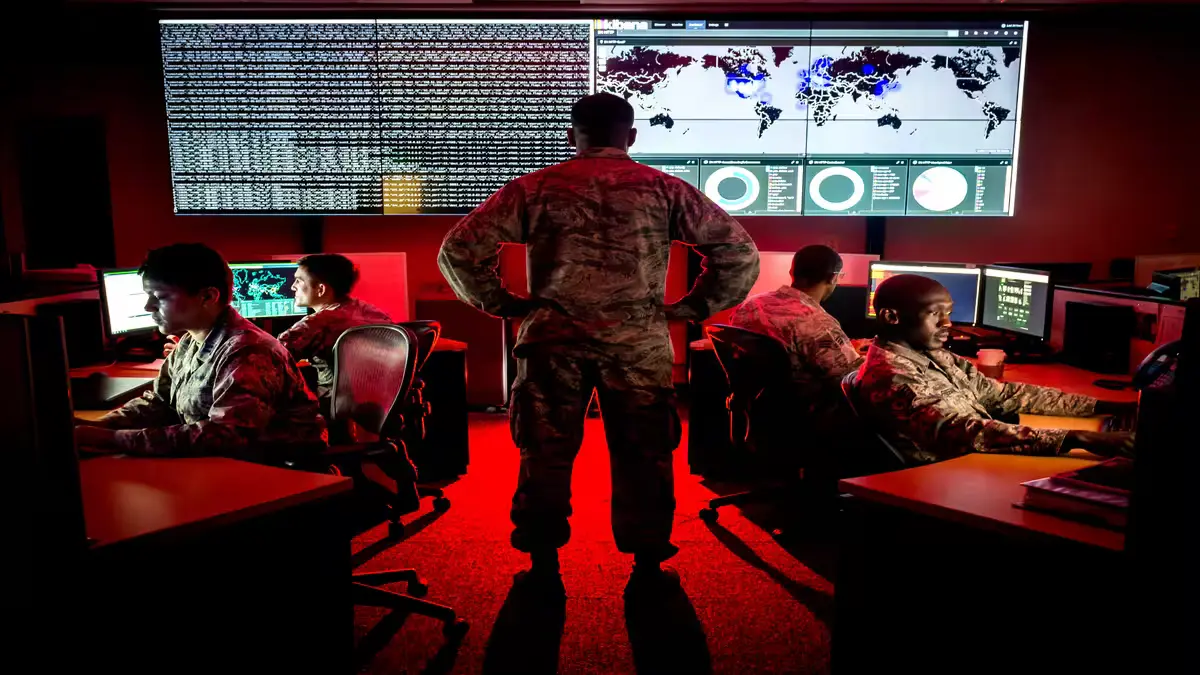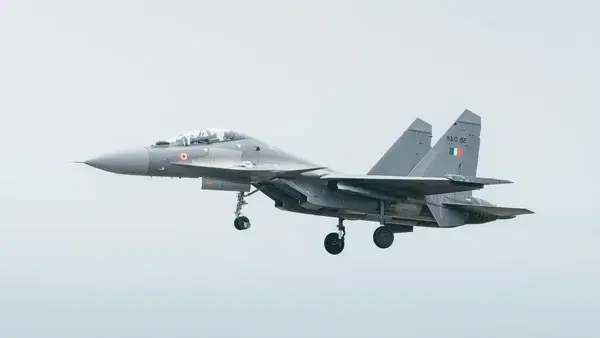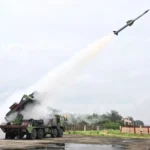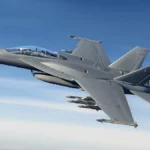The Cyberspace Capabilities Center (CCC), located at Scott Air Force Base, Illinois, is the primary organization developing cyber domain requirements in the United States Air Force.
The goals of the center are to achieve unity of effort across cyber organizations and functions, improve resource scalability, prioritize demands through multiple requirements processes, and define enterprise information technology roles from the services of the cyber operations mission.
“Simply put, the CCC will enhance how the Air Force delivers enterprise information technology capabilities in the future and provide opportunities to better support and develop the Airmen who work in this mission set,”
Brigadier General Chad Radug, director of Cyberspace and Information Dominance, said during a 2019 designation ceremony
The center traces its history to the establishment of the Army Airways Communications Systems Wing in 1943.
Air Force Elevates Cyberspace Capability Center to Streamline IT and Cyber Operations
The center, headquartered at Scott Air Force Base, Illinois, was established in 2019 and was responsible for delivering cyber capabilities. The recently announced change makes it a field management agency attached to the Secretariat, will not require the movement of people, and is expected to reach full operational capability by October 2025.
“This is an important step toward streamlining and unifying information technology functions and ensuring unity of effort in IT service delivery across the Air Force and Space Force,” Air Force Secretary Frank Kendall said in a statement. “By aligning and aligning these functions with their authorized owner, the IT enterprise will be able to produce capabilities in shorter, more rapid development cycles — ensuring that requirements are met more quickly and delivered to the Airmen and families who need them.”
According to a LinkedIn post from the Department of the Air Force’s CIO, as a field management agency, the center will develop and manage services such as cloud computing, cybersecurity, mobility and data centers to ensure interoperability and consistency across the department.
The move — which took effect Dec. 20, according to a release — is consistent with Kendall’s ongoing efforts to re-optimize DAF for great power competition, sweeping changes to how the service is organized, and the creation of new commands while shifting from more than 20 years of counterterrorism operations to confronting advanced adversaries like China.
As part of these changes, the Air Force has sought to elevate the role of cyber and IT functions, with upcoming steps including elevating Air Force Cyber and separating the intelligence and cyber roles at the deputy chief of staff level. The latter change is intended to enhance the role of IT, cyber and warfighting communications, with a dedicated three-star general serving as principal advisor to the secretary.
“Separating IT does not fulfill my goal of rapidly delivering capabilities based on the needs of our people,” Kendall said.
The development of the Cyberspace Capability Center, which will include realignment of functions from other organizations and future administrative changes, will more effectively organize, train and equip the IT enterprise and cyber workforce, according to the Air Force.
The move is also intended to align with the Air Force’s “one department, two services” concept since the establishment of the Space Force in 2019, which requires better alignment of structures between the two organizations.
“Many people don’t realize how broad our office’s statutory authority for IT is – there are many responsibilities that my office cannot delegate and that we are responsible for delivering and aligning across the enterprise, from business to war, intelligence, to common concern services,” DAF CIO Venice Goodwine said in a statement. “My responsibility is to the Secretary, but also to his staff and both services, to capture and develop their IT needs in a way that is not only responsive, but also cost-effective and interoperable with each other. We can do this through effective governance, and aligning the Cyberspace Capability Center with my office as the field operating agency will help strengthen compliance with the capability delivery process.”
Recommended to Read: Assistant Commandant of The Marine Corps (A Guide)
ARLINGTON, Va. (AFNS)
The Department of the Air Force is reorganizing the Headquarters Cyberspace Capability Center at Scott Air Force Base, Illinois, as a field management agency with the Office of the Air Force Chief Information Officer to streamline and integrate information technology functions, effective Dec. 20.
Next steps will include reorganizing functions in other organizations and future administrative changes.
“This is an important step toward streamlining and integrating information technology functions and ensuring unity of effort in IT service delivery across the Air Force and Space Force,” said Air Force Secretary Frank Kendall. “By aligning and aligning these functions with their authorized owners, the IT enterprise will be able to produce capabilities in shorter, more rapid development cycles — ensuring that requirements are met more quickly and delivered to the Airmen and families who need them.”
Kendall also reiterated the importance of this change, especially as the department re-optimizes for great power competition.
“The IT department has not met my goal of rapidly delivering capabilities based on the needs our people provide,” Kendall said.
The changes are intended to more effectively align, train, and equip the IT enterprise and cyberspace domains.
“Our men and women are accustomed to change, but we are particularly excited about this opportunity to refocus our mission around service delivery for the enterprise. We can already see the synergies building between our team and the DAF CIO staff,” said Col. Chris Rubiano, commander of the Headquarters Cyberspace Capability Center. “We look forward to onboarding other enterprise IT functions in the department and working with stakeholders to develop processes that help build capabilities for both Airmen and Guardians.”
As the Department of the Air Force has expanded to include the U.S. Space Force and the “one department, two services” mantra, the need to better represent that framework among IT stakeholders has become clear.
“Many people don’t realize how broad our office’s statutory authority for IT is—there are many responsibilities that my office cannot delegate, and we are responsible for delivery and synchronization across the enterprise, including all IT—from business to warfighting, intelligence, to the general interest services,” said Venice Goodwin. “I have a responsibility to the Secretary, but also to his staff and both services, to ensure that their IT needs are captured and developed in a way that is not only responsive but also cost-effective and interoperable with each other. We can do this through effective governance, and aligning the Cyberspace Capability Center with my office as the field operating agency will help strengthen compliance with the capability delivery process.”
FAQs
The CCC, located at Scott Air Force Base in Illinois, is the primary organization responsible for developing and managing the Air Force’s cyber and IT capabilities. Established in 2019, it was recently elevated to a field management agency under the Office of the Air Force Chief Information Officer (CIO) to streamline and integrate IT functions across the Air Force and Space Force. The move is intended to enhance the delivery of services such as cloud computing, cybersecurity, mobility, and data centers, ensuring interoperability and consistency across the department.
The CCC plays a key role in strengthening the Air Force’s cybersecurity by developing and managing critical services such as cloud computing, cybersecurity, mobility, and data centers. By aligning these functions with an authorized owner, the IT enterprise can produce capabilities in shorter, more rapid development cycles, ensuring that requirements are met more quickly and delivered to the Airmen and families who need them.
Aligning the CCC with the Air Force CIO centralizes authority and accountability for IT and cyber operations, enabling more efficient and effective management of resources and capabilities. This reorganization supports the Air Force’s broader strategy to modernize and secure its IT networks, integrating more business capabilities to increase resilience and agility to address evolving cyber threats.
CCC’s initiatives align with key cybersecurity trends, such as the increasing use of artificial intelligence (AI) by malicious actors and the growing importance of zero-trust architectures. By leveraging AI and machine learning, CCC aims to strengthen the Air Force’s cyber capabilities, increasing its ability to proactively detect and respond to threats. This approach reflects the broader defense community’s focus on adopting advanced technologies to strengthen cybersecurity measures.
Read More: Pentagon Scraps $96M Oura Ring Biometric Contract After DHA Cancellation








Leave a Reply